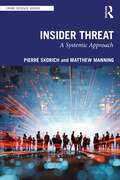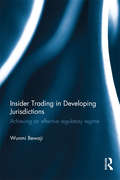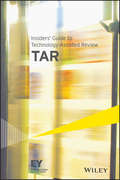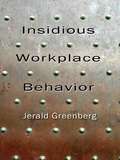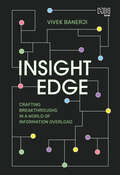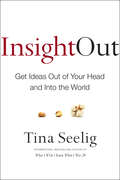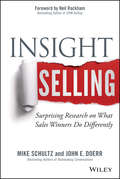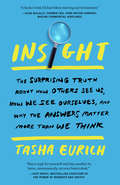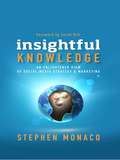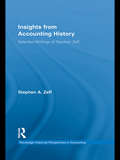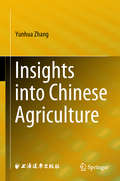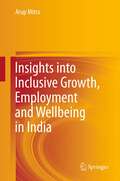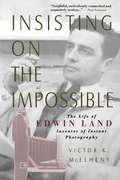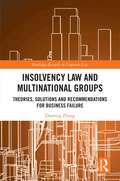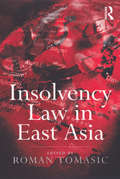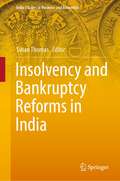- Table View
- List View
Insider Risk and Personnel Security: An introduction
by Paul MartinThis textbook analyses the origins and effects of insider risk, using multiple real-life case histories to illustrate the principles, and explains how to protect organisations against the risk. Some of the most problematic risks confronting businesses and organisations of all types stem from the actions of insiders – individuals who betray trust by behaving in potentially harmful ways. Insiders cause material damage to their employers and society, and psychological harm to the colleagues and friends they betray. Even so, many organisations do not have a systematic understanding of the nature and origins of insider risk, and relatively few have a coherent and effective system of protective security measures to defend themselves against that risk. This book describes the environmental and psychological factors that predispose some individuals to become harmful insiders, and the most common pathways by which this happens. It considers how aspects of insider risk have been altered by shifts in society, including our increasing reliance on technology and changes in working patterns. The second half of the book sets out a practical systems-based approach to personnel security – the system of defensive measures used to protect against insider risk. It draws on the best available knowledge from industry and academic research, behavioural science, and practitioner experience to explain how to make personnel security effective at managing the risk while enabling the conduct of business. This book will be essential reading for students of risk management, security, resilience, cyber security, behavioural science, HR, leadership, and business studies, and of great interest to security practitioners.
Insider Threat: A Systemic Approach (Crime Science Series)
by Matthew Manning Pierre SkorichEstablishing a new framework for understanding insider risk by focusing on systems of organisation within large enterprises, including public, private, and not-for-profit sectors, this book analyses practices to better assess, prevent, detect, and respond to insider risk and protect assets and public good.Analysing case studies from around the world, the book includes real-world insider threat scenarios to illustrate the outlined framework in the application, as well as to assist accountable entities within organisations to implement the changes required to embed the framework into normal business practices. Based on information, data, applied research, and empirical study undertaken over ten years, across a broad range of government departments and agencies in various countries, the framework presented provides a more accurate and systemic method for identifying insider risk, as well as enhanced and cost-effective approaches to investing in prevention, detection, and response controls and measuring the impact of controls on risk management and financial or other loss.Insider Threat: A Systemic Approach will be of great interest to scholars and students studying white-collar crime, criminal law, public policy and criminology, transnational crime, national security, financial management, international business, and risk management.
Insider Trading in Developing Jurisdictions: Achieving an effective regulatory regime
by Wunmi BewajiThe book examines the regulation of insider dealing in the developed jurisdictions, using three of the G7 countries as guides with the aim of knowing how they have regulated insider trading and what lessons can be learnt from their failures and achievements. It looks at regulatory regimes in the US, the UK and Japan in order to consider whether these regimes can be successfully transplanted to developing countries. In order to explore insider dealing in the developing world the book focuses on Nigeria, Africa’s most populous nation and second largest economy. This book examines in theoretical and empirical terms the law on insider trading away from the dogmatic approach of Western literature by presenting the subject from the prism of a developing jurisdiction in post-colonial Africa with a divergent cultural, historical, social, political and economic background. The author analyses what shape insider dealing takes in Nigeria, a predominantly illiterate society, and considers the groups involved. The books also explores how the concept of insider dealing regulation is understood amongst parties integral to its administration and enforcement such as lawyers, judges, stockbrokers, and ordinary investors. The legislation governing insider dealing regulation in Nigeria is critically examined to expose its strengths and weaknesses, and to see how foreign provisions and legislation have been incorporated. The book uses Nigerian experiences to consider its implications for other developing nations, arguing that regulatory regimes need to take into account the specific social, political, historical and economic factors of a particular locale rather than importing regulations wholesale from developed jurisdictions.
Insider's Guide To Passing The California Real Estate Exam
by Rockwell Publishing CompanyRockwell's Insider's Guide to Passing the California Real Estate Exam is designed to help you focus your exam preparation on the material that matters. The first steps to becoming a real estate agent in California include taking a required course in real estate principles and passing the salesperson's exam. The real estate principles course presents an overwhelming amount of information, and most students wonder how much of it they must memorize to pass the exam. The Insider's Guide distills the key concepts tested by the state and presents them in a way that facilitates understanding and retention. The Insider's Guide offers: a targeted review of all essential information, an easy to follow outline format, margin notes to emphasize key points, hundreds of sample exam questions, three complete exams that match the format of the state exam, answers and explanations for all questions, and an index that helps you locate specific information quickly. The Insider's Guide also includes a special section on test preparation strategies, filled with useful tips on how to improve your score.
Insiders' Guide to Technology-Assisted Review (TAR)
by Ernst Young LlpUnderstand TAR mechanics, processes, and technologies, as taught by EY experts Insider’s Guide to Technology-Assisted Review provides professionals with a thorough understanding of the process that is becoming increasingly important to the legal industry. With detailed discussion of the methods, technologies, and practices involved in TAR, readers without advanced degrees in linguistics or related technologies will gain a solid knowledge base upon which to evaluate both current practices and the new tools and technology continually hitting the market. Written by the world-renown experts at Ernst & Young’s Technology and Discovery Services, this book provides a valuable resource for professionals seeking a more efficient way to handle the discovery and analysis process. Technology-Assisted Review streamlines the discovery and document review process by essentially “training” a computer to evaluate documents as required. The term “predictive coding” is used in a narrower sense, but both terms have several meanings, and can mean different things to different firms. Insider’s Guide to Technology-Assisted Review cuts through the confusion, differentiating the different types of TAR and explaining the process and mechanics of each. Readers will: Understand the fundamental concepts of technology-assisted review Simplify ediscovery, documentation, and storage of large document sets Learn how TAR tools work, and the resources they require to function Consider the specialized skillset required to fully exploit TAR technology Technology-Assisted Review is here to stay, as the legal industry evolves to take full advantage of the cutting-edge technology becoming more widely available. As TAR becomes standard practice, it’s important for professionals to understand its possibilities and limitations. Insider’s Guide to Technology-Assisted Review provides clear, comprehensive guidance toward this complex topic.
Insidious Workplace Behavior (Applied Psychology Series)
by Jerald GreenbergInsidious Workplace Behavior (IWB) refers to low-level, pervasive acts of deviance directed at individual or organizational targets. Because of its inherently stealthy nature, scientists have paid little attention to IWB, allowing us to know very little about it. With this book, that now is changing. The present volume - the first to showcase this topic - presents original essays by top organizational scientists who share the most current thinking about IWB. Contributors examine, for example, the many forms that IWB takes, focusing on its antecedents, consequences, and moderators. They also highlight ways that organizational leaders can manage and constrain IWB so as to attenuate its adverse effects. And to promote both theory and practice in IWB, contributors also discuss the special problems associated with researching IWB and strategies for overcoming them. Aimed at students, scholars, and practitioners in the organizational sciences - especially industrial-organizational psychology, organizational behavior, and human resource management - this seminal volume promises to inspire research and practice for years to come.
Insight - Quarterly Magazine Issue- 34 Oct-Dec 2024
by Justin PhilipsIt is a General magazine, presents a diverse collection of expert insights, emerging trends, and in-depth analyses on current affairs, technology, business, and culture.
Insight Edge: Crafting Breakthroughs in a World of Information Overload
by Vivek BanerjiAs Artificial Intelligence reshapes industries, one question looms large: Where does human ingenuity fit?Drawing on decades of experience at organizations such as Insight Dojo, McKinsey and PepsiCo, Vivek Banerji reveals how to generate powerful insights that drive transformational success for organizations. He urges us to embrace the dynamic interplay of art and science, imagination and pragmatism, theory and practice - and to draw inspiration from diverse disciplines, whether it is machine learning, design, statistics, psychology, music, art or sports. Insight Edge makes a compelling case that information alone does not create insight. Instead, it is inherently human qualities - curiosity, analytical thinking, creativity and empathy - that shape meaningful strategies and drive breakthrough outcomes. With real-world examples and actionable frameworks, this book equips leaders and professionals - CEOs, marketers, customer insights experts, strategists, non-profit executives, entrepreneurs, and data analysts - to move beyond algorithms and tap into the irreplaceable power of human insight.
Insight Out
by Tina SeeligWhat if there were a clear set of instructions to help you bring your best ideas to life? As with a recipe, you could take a compelling idea and with concrete steps, transform it into something extraordinary.As a professor at Stanford University, Tina Seelig has dedicated her career to teaching the practice of moving from imagination to implementation. In Insight Out, she welcomes you into her classroom and crisply defines the core concepts of imagination, creativity, innovation, and entrepreneurship, presenting an elegant and much-needed model she calls the "Invention Cycle." This new approach enables you to see obstacles as opportunities, inspire others to share your vision, and ultimately bring more ideas to fruition.Filled with surprising research, examples from her Stanford classroom, and stories from around the world--Silicon Valley to San Quentin State Prison, rural Pakistan to the North Pole--Insight Out offers essential and unexpected strategies that will help bring even the slightest flicker of an idea to life. Equally useful for students, educators, entrepreneurs, and would-be innovators in all fields, this is an essential road map for anyone who wants to get ideas out of their head and into the world.
Insight Selling: Surprising Research on What Sales Winners Do Differently
by John E. Doerr Mike Schultz Neil RackhamWhat do winners of major sales do differently than the sellers who almost won, but ultimately came in second place? Mike Schultz and John Doerr, bestselling authors and world-renowned sales experts, set out to find the answer. They studied more than 700 business-to-business purchases made by buyers who represented a total of $3.1 billion in annual purchasing power. When they compared the winners to the second-place finishers, they found surprising results. Not only do sales winners sell differently, they sell radically differently, than the second-place finishers. In recent years, buyers have increasingly seen products and services as replaceable. You might think this would mean that the sale goes to the lowest bidder. Not true! A new breed of seller--the insight seller--is winning the sale with strong prices and margins even in the face of increasing competition and commoditization. In Insight Selling, Schultz and Doerr share the surprising results of their research on what sales winners do differently, and outline exactly what you need to do to transform yourself and your team into insight sellers. They introduce a simple three-level model based on what buyers say tip the scales in favor of the winners: Level 1 "Connect." Winners connect the dots between customer needs and company solutions, while also connecting with buyers as people. Level 2 "Convince." Winners convince buyers that they can achieve maximum return, that the risks are acceptable, and that the seller is the best choice among all options. Level 3 "Collaborate." Winners collaborate with buyers by bringing new ideas to the table, delivering new ideas and insights, and working with buyers as a team. They also found that much of the popular and current advice given to sellers can damage sales results. Insight Selling is both a strategic and tactical guide that will separate the good advice from the bad, and teach you how to put the three levels of selling to work to inspire buyers, influence their agendas, and maximize value. If you want to find yourself and your team in the winner's circle more often, this book is a must-read.
Insight: How Small Gains in Self-Awareness Can Help You Win Big at Work and in Life (Expert Thinking Ser.)
by Tasha EurichThe first definitive book exploring the science of self-awareness, the meta-skill of the 21st century, Insight is a fascinating journey into everyone's favorite topic: themselves. Do you know who you really are? Do you ever wonder how other people really see you? Though we are usually confident that we do, we are wrong more often than we think. And if we could see ourselves through others’ eyes, we might be really surprised. Yet regardless of our line of work or stage of life, success depends on understanding who we are and how we come across. Research shows that self-awareness means better work performance, smarter life choices, deeper, more meaningful relationships, and a more fulfilling career. There’s just one problem: people can be remarkably poor judges of their behavior, performance, and impact on others. And despite the lip service given today to “feedback,” in the business world and beyond, it’s rare to get candid, objective data on what we’re doing well, and where we could stand to improve. Of course, at work and in life, we’ve all come across people with a stunning lack of self-awareness—but how often do we consider whether we might have the same problem? And if we did, how would we even know it?Drawing on her three-year, first-of-its-kind study of people who have dramatically improved their self-awareness, organizational psychologist Tasha Eurich reveals why we don’t know ourselves as well as we think—and what to do about it. Alongside her research, she integrates hundreds of academic studies and her 15 years of work with Fortune 500 clients, challenging conventional “wisdom” to reveal many surprising truths—like why introspection is the enemy of insight, how experience isn’t a bullet train to self-knowledge, and just how far others will go to avoid telling us the truth about ourselves. Readers will learn battle-tested techniques and tools to improve self-awareness and thus their work performance, leadership skills, interpersonal relationships, and more. Insight is a guide surviving and thriving in an unaware world.
InsightSquared: Developing the Sales and Marketing Plan
by Frank V. Cespedes Mark Roberge Thomas R. EisenmannCase
InsightSquared: Developing the Sales and Marketing Plan
by Frank V. Cespedes Thomas R. Eisenmann Mark N. RobergeCase
Insightful Knowledge: An Enlightened View of Social Media
by Stephen MonacoAn Excellent Business Guide for the Thorough Comprehension and Execution of Social Media Marketing and Adapting Into a Social Business! Social media marketing has gone from a "nice to have" to a "must have" - the ability for companies to succeed online is no longer a viable option without it. Social media communications can be intimidating. Top marketing expert and social business strategist Stephen Monaco guides you through the strategies and marketing tactics that make up the best practices for successful social media marketing. Monaco gives you everything you need to create and implement your own social media strategy with confidence. Insightful Knowledge is the tool you need to create your plan. If you are looking for a book authored by someone who has effectively created marketing strategies and tactics in multiple industries over 25 years - Insightful Knowledge is for you. It will help you... if you don't know where to start with your social media initiatives if you've started your social media initiatives but don't know if you're on the right track if your social media initiatives aren't tied to specific business objectives if you don't use social media monitoring/listening platforms tools if you don't know what consumers are saying about your brand online if you're not engaging consumers with relevant content across multiple platforms if you no longer know how to reach potential customers if the rapid tempo of today's business makes it difficult to adapt to change Insightful Knowledge is the only resource you will need to understand what social media means to your business and how to create your strategy to keep your business relevant and develop a more productive relationship with your customers and prospects than you have ever had. Complete with examples across all industries, written in an easy to understand format and without all the confusing jargon. You'll utilize this book as a resource, keep it handy, and refer back to it for many years to come.
Insights from Accounting History: Selected Writings of Stephen Zeff (Routledge Historical Perspectives in Accounting)
by Stephen A. ZeffStephen Zeff has been a prolific researcher on the history of accounting and auditing in the twentieth century. He has written numerous papers on the history of standard setting and regulation, of accounting and auditing practice, of the accounting profession, of accounting thought, and of the intellectual contributions of major authors (such as Hatfield, Canning, Paton and MacNeal). This volume brings together the greatest hits of Zeff's academic career, including several articles that were published in out-of-the way places, for easier use by students and researchers of the field. In an introduction, Zeff discusses the evolution of his research interests and explains the factors led to the writing of the papers and their intended contribution to the literature. The book also includes a complete list of his publications.
Insights in the Economics of Aging
by David A. WiseThe fraction of the population over age sixty-five in many developed countries is projected to rise, in some cases sharply, in coming decades. This has drawn growing interest to research on the health and economic circumstances of individuals as they age. Many individuals are retiring from paid work, yet they are living longer than ever. Their well-being is shaped by their past decisions such as their saving behavior, as well as by current and future economic conditions, health status, medical innovations, and a rapidly evolving landscape of policy incentives and supports. The contributions to Insights in the Economics of Aging uncover how financial, physical, and emotional well-being are integrally related. The authors consider the interactions between financial circumstances in later life, such as household savings and home ownership, physical circumstances such as health and disability, and emotional well-being, including happiness and mental health.
Insights into Changing Centralized Mind-Sets: Moving Beyond Budgeting
by Jeremy Hope Robin FraserAbandoning central planning and control functions in favor of a devolution of power to front-line managers is a tough challenge. The problem that most often plagues this transition is a lack of understanding of what leaders need to do to make empowerment work effectively. This chapter examines a number of key elements that are common to a successful transition.
Insights into Chinese Agriculture
by Yunhua Zhang Curtis EvansThis book uses simple economic theories to explain how China's agricultural economic phenomena exists in reality. It also helps the reader to get a clear understanding of economic phenomena, insight into the "hog cycle" and "food safety," as well as other economic and social phenomena. The language of this book is not only easy to understand, but also uses ancient poetry and humor to make the subject interesting, as it speaks to the history and current situation of Chinese agriculture. It also opens a window for the people to read about agriculture. This is a unique book on agricultural science that fills an important gap in works on agricultural science and agricultural economics.
Insights into Implementation: Moving Beyond Budgeting
by Jeremy Hope Robin FraserFor those considering the abandonment of the annual budgeting process in favor of more adaptive management processes, this chapter draws important lessons from the implementation of budgeting alternatives at several firms.
Insights into Inclusive Growth, Employment and Wellbeing in India
by Arup MitraWhat changes are occurring at the macro and the sectoral levels, how the labour market changes are taking place and what impact is felt on the low income households are some of the questions that the present volume focuses on. It begins by examining the sectoral composition of growth, revisiting the issues related to industry-services balance, and also brings out the spatial dimension of growth. On the one hand the industry does not seem to have played a major role in the context of employment generation as imported technology is by and large capital intensive in nature. On the other hand, the services-led growth is seen to have reduced the pace of poverty reduction. Given the services-led growth the possible impact of trade in services on employment both in the formal and informal sectors have been worked out, indicating limited positive spill-over effects. The labour market outcomes are brought out with great details suggesting that rapid economic growth in India could not result in productive employment generation on a large scale. The gender dimensions of employment are brought out to verify if reduction in labour market inequality can result in improving the position of women in other spheres encompassing the decision making process both within the household and outside the household. Issues relating to urbanisation and rural-urban migration are also covered to understand the dynamics of urban poverty and to bring out the challenges of population transfer given the spatial concentration of growth. The job search practices pursued by the low income households are often pursued in terms of informal networks. What problems are associated with such mechanisms in experiencing improvements in wellbeing levels are covered in the present volume. On the whole, the volume offers an explanation of limited poverty reduction in a situation of rapid economic growth on the basis of an inter-disciplinary framework though efforts are being made to keep the methodology quantitatively rigorous.
Insights into the New Hydrogen Economy
by Joseph B. Powell William J. Nuttall Adetokunboh T. Bakenne Karim L. Anaya-Stucchi Andy WilsonThis open access book offers a comprehensive exploration of the future of the hydrogen industry. It builds upon insights gathered from a series of expert workshops and follow-on activity. International experts from various fields, including industry, public policy, and academia, engaged in dialogue and knowledge exchange, resulting in invaluable findings and observations. This book builds upon that process to offers an in-depth analysis of the key issues facing commercial hydrogen energy development in the late 2020s. It highlights how hydrogen has the potential to emerge as a major component of the global energy industry, aiding the decarbonization process. Among the important lessons learned, the book discusses how both hydrogen and electrification will both play a significant role in the energy sector, but hydrogen could emerge as the larger energy carrier, and the two developments will largely operate independently of each other. The book also highlights the significance of industrial infrastructure such as ports, pipelines, hubs, and clusters in scaling up hydrogen use. Finally, the book considers the importance of hydrogen purity for future applications and acknowledges the potential for geologically sourced hydrogen to be a vital component of supply in the future.
Insisting on the Impossible: The Life of Edwin Land, Inventor of Instant Photography (Sloan Technology Series)
by Victor K. McelhenyThis fascinating biography of the great inventor and entrepreneur Edwin Land captures the very essence of technological innovation. Renowned as the inventor of instant photography, Land won 535 patents, joining Edison among the world's most prolific inventors. While still in his teens, this Magellan of modern technology invented sheet polarizers and went on to build a tiny research lab into a gigantic enterprise that turned out a vast and continuous array of innovations. McElheny draws a vivid and memorable portrait of this extraordinary man, in the lab, in the boardroom, in high-secret defense work including the spearheading of the U2 spy plane. His penetrating insight into Land's innovative genius will speak to anyone interested in business, science, photography or government.
Insolvency Law and Multinational Groups: Theories, Solutions and Recommendations for Business Failure (Routledge Research in Corporate Law)
by Daoning ZhangThe insolvency of multinational corporate groups creates a compelling challenge to the commercial world. As many medium and large-sized companies are multinational companies with operations in different countries, it is important to provide appropriate solutions for the insolvency of these key market players. This book provides a comprehensive overview of the cross-border insolvency theories, practical solutions and regulatory solutions for the insolvency of multinational corporate groups. Whilst the book recognises certain merits of these solutions, it also reveals the limitations and uncertainty caused by them. An analysis of the provisions and tools relating to cross-border insolvency of multinational corporate groups in the new EU Regulation on insolvency proceedings 2015, the UNCITRAL Model Law on cross-border insolvency, the Directive on preventive restructuring frameworks and the Bank Recovery and Resolution Directive 2014, along with a study of directors’ duties, are included in this book. This book focuses on the insolvency and rescue of non-financial corporate groups. However, it is also important to recognise the similarities and differences between corporate insolvency regimes and bank resolution regimes. In particular, lessons learnt from bank resolution practices may be useful for non-financial corporate groups. This book aims to provide an in-depth examination of the existing solutions for the insolvency of multinational corporate groups. It also aims to view cross-border insolvency of corporate groups within a broad context where all relevant regimes and theories interact with each other. Therefore, directors’ duties in the vicinity of insolvency, preventive insolvency proceedings, procedural consolidation, international cooperative frameworks and bank resolution regimes are considered together. This book may appeal to academics, students and practitioners within the areas of corporate law, cross-border insolvency law and financial law.
Insolvency Law in East Asia
by Roman TomasicInsolvency law reform has become a subject of public urgency in many countries in the past two decades and particularly in much of Asia over the last ten years. This volume provides an overview of insolvency laws and related rules and procedures in the countries of East Asia. The book comprises two introductory chapters dealing with issues such as legal culture and cross-border insolvency, before examining the fourteen principal jurisdictions in the region. Each chapter addresses the key themes of different insolvency regimes, such as: the legal system and culture; personal insolvency laws; corporate insolvency rules; court-based schemes of arrangement; winding-up procedures; liquidators; enforcement; and offences. This title will be an invaluable guide to academics, practitioners and policy makers working in the areas of comparative and commercial law.
Insolvency and Bankruptcy Reforms in India (India Studies in Business and Economics)
by Susan ThomasThis book is about the establishment of the Insolvency and Bankruptcy Code, in 2016, one of the most important new developments in Indian commercial law. The law has major implications for firms, their creditors, and a variety of the professional services that feed into the decisions of borrowers and lenders including lawyers, accountants and valuers. A new profession of insolvency professionals has come to exist owing to the law. There are several questions about bankruptcy reform in the mind of researchers, policy makers and practitioners. How has the reform progressed? How has it reshaped the incentives of firms? What are the difficulties faced? What are the optimal paths for borrowers and lenders and their advisors under the rubric of the law? How should laws and institutions be modified? The book has a unique set of chapters, by key people who have shaped the field which offer novel insights into these questions.The book has been edited by key people who have worked on bankruptcy reform since 2010. Dr. Sahoo has been the chairperson of the Insolvency and Bankruptcy Board of India since the establishment of this regulatory agency. Dr. Thomas was a member of the Bankruptcy Law Reforms Committee which drafted the IBC, and led the internal team of the BLRC which drafted the law. The book is an authentic and credible analysis of the happenings in the Indian insolvency and bankruptcy ecosystem from the start, with interest areas for international and domestic, economics/finance and law, researcher and practitioner communities.

